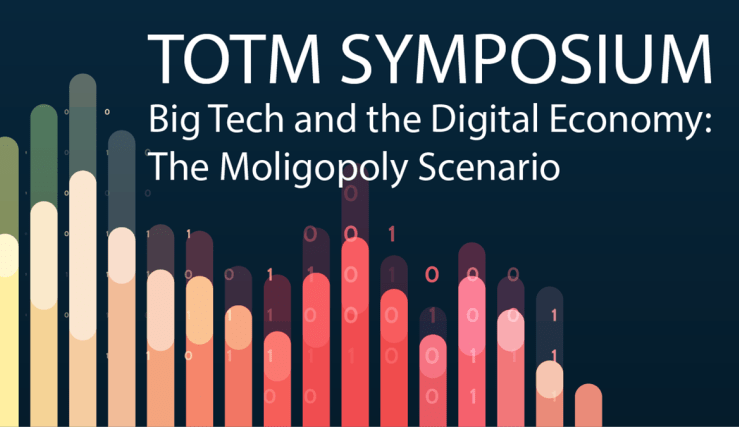Showing results for: “digital markets act”
AICOA Is Neither Urgently Needed Nor Good: A Response to Professors Scott Morton, Salop, and Dinielli
Earlier this month, Professors Fiona Scott Morton, Steve Salop, and David Dinielli penned a letter expressing their “strong support” for the proposed American Innovation and Choice Online Act (AICOA). In the letter, the professors address criticisms of AICOA and urge its approval, despite possible imperfections. “Perhaps this bill could be made better if we lived in ... AICOA Is Neither Urgently Needed Nor Good: A Response to Professors Scott Morton, Salop, and Dinielli
Antitrust Statutorification
A lot of water has gone under the bridge since my book was published last year. To close this symposium, I thought I would discuss the new phase of antirust statutorification taking place before our eyes. In the United States, Congress is working on five antitrust bills that propose to subject platforms to stringent obligations, ... Antitrust Statutorification
Your Definitive End-of-Year Global Tech Regulation Wrap-Up: Who’s Doing What, Where, and What to Make of It
As 2023 draws to a close, we wanted to reflect on a year that saw jurisdictions around the world proposing, debating, and (occasionally) enacting digital regulations. Some of these initiatives amended existing ex-post competition laws. Others were more ambitious, contemplating entirely new regulatory regimes from the ground up. With everything going on, it can be ... Your Definitive End-of-Year Global Tech Regulation Wrap-Up: Who’s Doing What, Where, and What to Make of It
Professor Carrier’s Response
First of all, I would like to express my deepest gratitude to Josh Wright. Only because of Josh’s creativity and tireless, flawless execution did this blog symposium come about and run so smoothly. I also would like to thank Dennis Crouch, who has generously cross-posted the symposium at PatentlyO. And I am grateful for the ... Professor Carrier’s Response
UMC Rulemaking After Magnuson-Moss: A Textualist Approach
Introduction The Federal Trade Commission’s (FTC) ability to conduct substantive rulemaking under both its “unfair methods of competition” (UMC) and “unfair and deceptive practices” (UDAP) mandates was upheld by the U.S. Court of Appeals for the D.C. Circuit in 1973’s National Petroleum Refiners Association v. FTC. Nonetheless, the FTC has seldom exercised this authority with ... UMC Rulemaking After Magnuson-Moss: A Textualist Approach
Time for Congress to Consider Establishing a “SMARTER” Antitrust Merger Review Framework
On October 7, 2015, the Senate Judiciary Committee held a hearing on the “Standard Merger and Acquisition Reviews Through Equal Rules” (SMARTER) Act of 2015. As former Antitrust Modernization Commission Chair (and former Acting Assistant Attorney General for Antitrust) Deborah Garza explained in her testimony, “t]he premise of the SMARTER Act is simple: A merger ... Time for Congress to Consider Establishing a “SMARTER” Antitrust Merger Review Framework
Revisiting the Theory and Evidence on State CPAs and FTC Act Section 5 Follow-ons
One of the most fundamental issues in the ongoing debate concerning the costs and benefits of expanded FTC Section 5 enforcement is the extent to which one must be concerned with its collateral consequences. A central claim of proponents of a broad interpretation of Section 5 coupled with its aggressive enforcement is that concerns with ... Revisiting the Theory and Evidence on State CPAs and FTC Act Section 5 Follow-ons
Section 5 of the FTC Act and monopolization cases: A brief primer
In the past two weeks, Members of Congress from both parties have penned scathing letters to the FTC warning of the consequences (both to consumers and the agency itself) if the Commission sues Google not under traditional antitrust law, but instead by alleging unfair competition under Section 5 of the FTC Act. The FTC is rumored to be ... Section 5 of the FTC Act and monopolization cases: A brief primer
Breaking Down House Democrats’ Forthcoming Competition Bills
Democratic leadership of the House Judiciary Committee have leaked the approach they plan to take to revise U.S. antitrust law and enforcement, with a particular focus on digital platforms. Broadly speaking, the bills would: raise fees for larger mergers and increase appropriations to the FTC and DOJ; require data portability and interoperability; declare that large ... Breaking Down House Democrats’ Forthcoming Competition Bills
Manne & Stout 1: The Illogic of a Contract/Merger Equivalency Assumption in the Assessment of Vertical Mergers
[TOTM: The following is part of a symposium by TOTM guests and authors on the 2020 Vertical Merger Guidelines. The entire series of posts is available here. This post is authored by Geoffrey A. Manne (President & Founder, ICLE; Distinguished Fellow, Northwestern University Center on Law, Business, and Economics ); and Kristian Stout (Associate Director, ... Manne & Stout 1: The Illogic of a Contract/Merger Equivalency Assumption in the Assessment of Vertical Mergers
The Collateral Order Doctrine and State Action Immunity: Salt River Power District, Antitrust Federalism, and the Burden of State-Supported Monopoly
On December 1, 2017, in granting certiorari in Salt River Project Agricultural Improvement and Power District v. SolarCity Corp., the U.S. Supreme Court agreed to consider “whether orders denying antitrust state-action immunity to public entities are immediately appealable under the collateral-order doctrine.” At first blush, this case might appear to involve little more than a ... The Collateral Order Doctrine and State Action Immunity: Salt River Power District, Antitrust Federalism, and the Burden of State-Supported Monopoly
Consumer Welfare-Based Antitrust Enforcement is the Superior Means to Deal with Large Digital-Platform Competition Issues
There has been a rapid proliferation of proposals in recent years to closely regulate competition among large digital platforms. The European Union’s Digital Markets Act (DMA, which will become effective in 2023) imposes a variety of data-use, interoperability, and non-self-preferencing obligations on digital “gatekeeper” firms. A host of other regulatory schemes are being considered in ... Consumer Welfare-Based Antitrust Enforcement is the Superior Means to Deal with Large Digital-Platform Competition Issues








